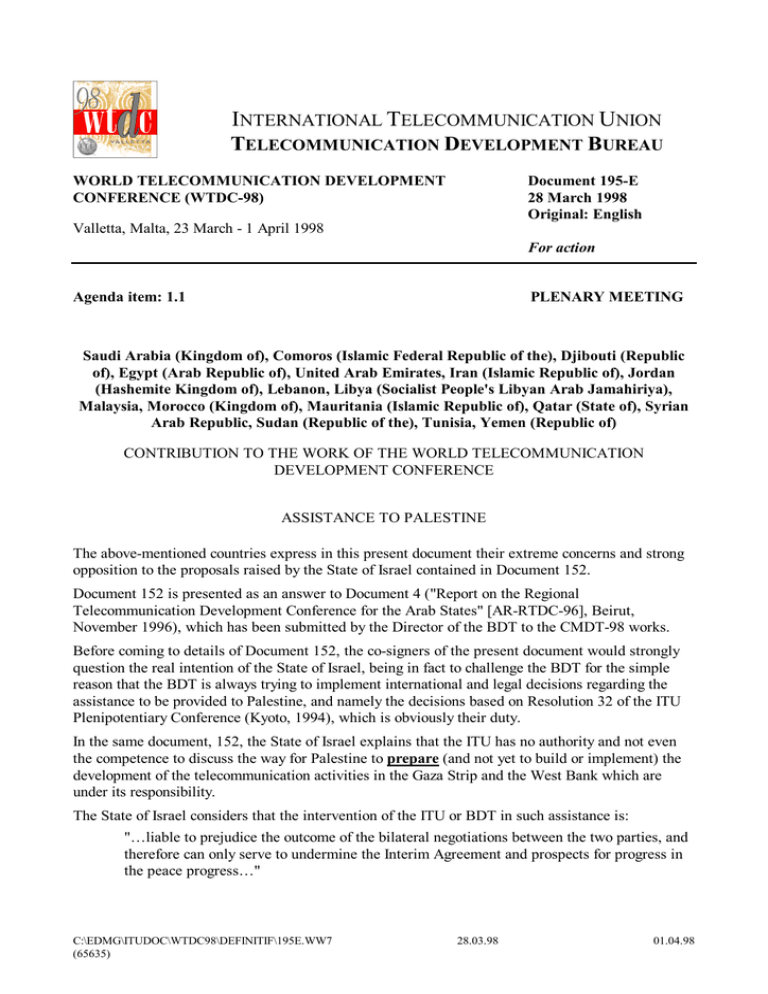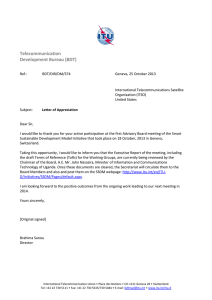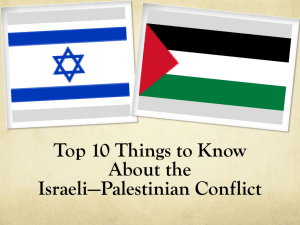I T U D
advertisement

I NTERNATIONAL TELECOMMUNICATION UNION TELECOMMUNICATION DEVELOPMENT BUREAU Document 195-E 28 March 1998 Original: English WORLD TELECOMMUNICATION DEVELOPMENT CONFERENCE (WTDC-98) Valletta, Malta, 23 March - 1 April 1998 For action Agenda item: 1.1 PLENARY MEETING Saudi Arabia (Kingdom of), Comoros (Islamic Federal Republic of the), Djibouti (Republic of), Egypt (Arab Republic of), United Arab Emirates, Iran (Islamic Republic of), Jordan (Hashemite Kingdom of), Lebanon, Libya (Socialist People's Libyan Arab Jamahiriya), Malaysia, Morocco (Kingdom of), Mauritania (Islamic Republic of), Qatar (State of), Syrian Arab Republic, Sudan (Republic of the), Tunisia, Yemen (Republic of) CONTRIBUTION TO THE WORK OF THE WORLD TELECOMMUNICATION DEVELOPMENT CONFERENCE ASSISTANCE TO PALESTINE The above-mentioned countries express in this present document their extreme concerns and strong opposition to the proposals raised by the State of Israel contained in Document 152. Document 152 is presented as an answer to Document 4 ("Report on the Regional Telecommunication Development Conference for the Arab States" [AR-RTDC-96], Beirut, November 1996), which has been submitted by the Director of the BDT to the CMDT-98 works. Before coming to details of Document 152, the co-signers of the present document would strongly question the real intention of the State of Israel, being in fact to challenge the BDT for the simple reason that the BDT is always trying to implement international and legal decisions regarding the assistance to be provided to Palestine, and namely the decisions based on Resolution 32 of the ITU Plenipotentiary Conference (Kyoto, 1994), which is obviously their duty. In the same document, 152, the State of Israel explains that the ITU has no authority and not even the competence to discuss the way for Palestine to prepare (and not yet to build or implement) the development of the telecommunication activities in the Gaza Strip and the West Bank which are under its responsibility. The State of Israel considers that the intervention of the ITU or BDT in such assistance is: "… liable to prejudice the outcome of the bilateral negotiations between the two parties, and therefore can only serve to undermine the Interim Agreement and prospects for progress in the peace progress… " C:\EDMG\ITUDOC\WTDC98\DEFINITIF\195E.WW7 (65635) 28.03.98 01.04.98 -2CMDT98/195-E This is obviously wrong, ITU having been involved in some many issues, in the past, in bilateral negotiations with all the countries in the world, without putting those negotiations down. Such a way to work, used by the State of Israel, to consider positively or negatively the authority or the competence of the ITU, only upon its own particular and current interests, is not acceptable. It gives a clear understanding of the methods which are currently used by the State of Israel during the negotiations with Palestine in the peace process. Document 152 tries to explain that the State of Israel is currently helping Palestine regarding the development of telecommunications activities in the Gaza Strip and the West Bank. Do the administrations attending this WTDC-98 really consider as a "help" the fact for the State of Israel to: • Implement 8 000 PSTN lines a year for a population of 3 million people (which is six times less than the most underdeveloped area in Israel)? • Refuse the physical link of telecommunication services between the Gaza Strip and the West Bank? • Disturb the GSM system in the Gaza Strip and the West Bank, and until this moment, not handing over the sections of frequencies to the Palestinians? • Refuse assignment of eight frequencies for the use of broadcasting which was agreed upon in the Oslo Agreement? The Interim Agreement, after having considered the right for Palestine to establish its own and independent telecommunication policies, precisely indicates that: "… the two parts are negotiating in order to let the Palestinian Authority to use a separate area code and numbering plan, pending the establishment of a separate Palestinian network and gateway… " Which means that what is actually discussed between the two parts is not the right for Palestine to have an international code or its own frequency assignments (already accepted by the two parts), but the way to implement it, which will indeed be done upon an agreement between the two parties. Conclusion Document 4, submitted by the Director of the BDT, as well as Resolution 4 of the [AR-RTDC-96] (Beirut, November 1996) are not against negotiations between the State of Israel and the Palestinian Authority, but would like to reaffirm the right for Palestine to: • have its own international code; • proceed to its own frequency assignments; • have its own call signs; • be, in the future, a member of the ITU. The co-signers of this document ask all administrations to support the position expressed herein, which will be helpful especially for the negotiations between the Palestinian Authority and the State of Israel. We invite the Conference to adopt a resolution which will conform to the terms of Resolution 4 of the [AR-RTDC-96], Beirut, November 1996 referred to in Document 4 submitted by the Director of the BDT. C:\EDMG\ITUDOC\WTDC98\DEFINITIF\195E.WW7 (65635) 28.03.98 01.04.98


